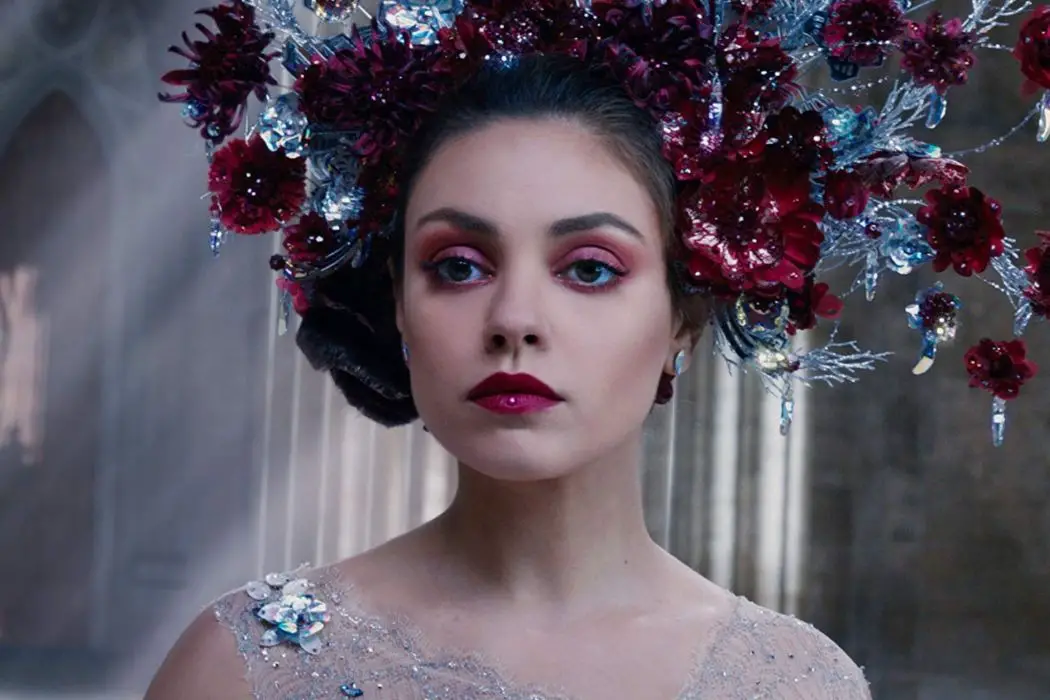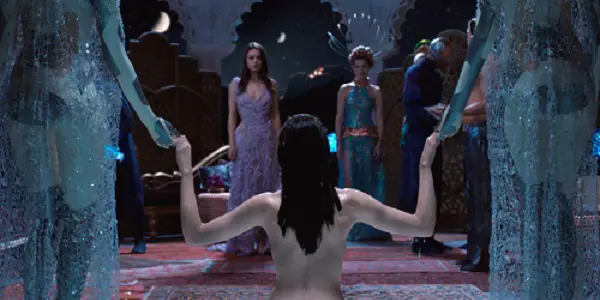Defending JUPITER ASCENDING: The Matrix As A Coming-Out Party

A writer of fiction and criticism, and English student based…
The creative duo of Lana and Lilly Wachowski have had a fascinating career trajectory in over twenty-five years of activity. Even before the Matrix trilogy debuted in 1999, the siblings were no stranger to breaking new ground, starting with the landmark lesbian neo-noir Bound (1996). Nor were they afraid of being boldfaced in sharing their many influences, be they from cinema, anime, or comic books. Their post-Matrix work has met divisive responses. Such efforts have been called “unparalleled disaster” about as equally as they’ve been hailed as an “unsung masterpiece,” with the late Roger Ebert call their 2008 epic Cloud Atlas “one of the most ambitious films ever made.”
However, it was 2015’s Jupiter Ascending that drew the shortest straw, receiving near-unanimous negative press. Nobody knew what to make of this new universe the Wachowskis created, or what Eddie Redmayne was thinking with his bizarre performance. Despite the reception, Jupiter Ascending didn’t take long to appeal to a subset of sci-fi fans, mostly women. These appreciators will admit to the film’s flaws, yet still can’t help but love it for how earnest and fresh it is in the cinematic landscape of speculative fiction. Detractors can scoff and rhetorically wonder why anyone would enjoy such a project without irony, but it demands a deeper look to admire the unique experience this campy space opera provides.
A Certain Stigma
Jupiter Ascending follows the story of one Jupiter Jones (Mila Kunis), a young woman born to Russian parents under a certain astrological sign that would mark her for greatness. Unfortunately, her reality as an immigrant to the United States has her scrubbing toilets and cleaning houses instead. One fateful day, several aliens attempt to assassinate her until she is rescued by Caine (Channing Tatum), a dashing half-man half-wolf alien with jet boots, who was tasked with taking her to his boss. Before leaving Earth, they stop at the home of an exiled alien, where the tenant reveals that she is the reincarnation of royalty, specifically the matriarch of an alien dynasty that will inherit the entire universe.

Fair is fair: this is one of the most ridiculous premises I’ve ever described. It sounds like the synopsis of a young adult novel. An apt comparison, given that Jupiter and the YA genre (especially going into the 2010s) have been maligned or mocked in most vocal circles, all while happening to have predominantly female fanbases. In fact, Googling “Jupiter Ascending Twilight” will present the results of negative reviews comparing the two hated properties, and people I’ve known personally made the comparison on instinct. Nerd culture has a history of turning little attention towards female-led stories in their niche genres, if not outright shunning them. They’ve adopted such a critical eye to anything with a feminine presence so strongly within that they’ve made an entire trope out of it: the Mary Sue.
This isn’t to say there aren’t plenty justifiable reasons to dislike Twilight, or any other piece of YA fiction that comes to mind. They all have their fair shares of fundamental and moral failings, but these aren’t the conversations being had. What permeates the discussion is people making fun of the new “wish-fulfillment fantasy” that some lady made for a bunch of younger ladies to cheer at in approval. In truth, all art is self-indulgence. There’s nothing more gratifying to a creator than making what they want to see available to others. Believe me, I know. Wish fulfillment is not inherently bad, and Jupiter certainly fits that bill, but it is something celebrated by its supporters.
Donna Dickens, writing for Uproxx, stated that the film is a refreshing take on women in science fiction, one that doesn’t “strip anything feminine from a character and replace it with Arnold Schwarzenegger with boobs,” and is open to women who “want to be the same klutzy nobody who is cosseted and petted and told we’re special – despite all evidence to the contrary.” It’s the same troubled beginning that male heroes like Luke Skywalker, Harry Potter or Neo were given before having greatness thrust upon them. Even better, this exists in a film made for nine-figures and released by a major studio. There’s a freshness to seeing something of this magnitude be so earnest about its feminine fantasy, and that niche market happily accepted it.

Transcendent Fantasy
Coming down to the essentials of Jupiter Ascending, there’s not so much at odds with it compared to the rest of the Wachowskis’ filmography, including their other most successful property, The Matrix. Knowing that the sisters are both trans women, it was inevitable that the series would warrant readings as an allegory for transitioning. Such a fact brings the thought that Jupiter is the Wachowskis fully embracing their gender identity, creating a representation of their transition.
It explains how all the themes of The Matrix come to a head in the feminine perspective. There’s the same amount of philosophizing over one’s place in the universe, the existence and compassion towards lives elsewhere, and points made about unlocking one’s true potential and identity. Jupiter stands out especially from the bunch, boasting the largest budget the pair have worked with. The end result allows more ambition in costumes, creatures and visuals. It’s as if even more beautiful possibilities are open to the heroine than the hero from over a decade before.
There’s one scene in particular that’s an attest to this: Tuppence Middleton‘s character is the sole sister in the dynasty Jupiter descends from, and the only one who uses her inheritance for means that aren’t self-serving or lavish. A feminist reading is far from out of the question here, but it’s witnessing her emerge from her personal pool of youth, watching the older and graying woman we’ve seen up to this point recede several decades—with Jupiter looking on in bewilderment. This is the first woman she’s interacting with on a civil level in the new world, and she’s amazed.

There’s a sense of release and power in the frame, and the flourish in the great composer Michael Giacchino’s score is a kind that never returns in the film. It’s akin to the best kind of sexual discovery, a glorious freedom to present one’s true self on the screen.
The Perfect Curtain Call
After already making one of the defining action films of a generation, nothing could’ve ruined the Wachowskis’ reputation. So naturally, business continued as usual after the failure of Jupiter, along with the revelation of Lilly Wachowski’s transition. The sisters went on to produce the acclaimed Netflix series Sense8, a culmination of all their themes toward universality, exploitation, and the relief in not being alone in the universe. After its unfortunate cancellation two seasons in, Lana took up the feature directing task alone for the first time (Lilly was taking a hiatus), giving the beloved characters closure in a TV movie.
All’s been mostly quiet on that front since. The reports in October 2018 that the Wachowskis were closing their offices in their native Chicago led to stir rumors that they were retiring from filmmaking altogether. There are the occasional added rumors that they’re developing some newer, bigger addition to the Matrix universe, but they’re unfounded. Lilly Wachowski’s return to filmmaking has been announced this past May as the producer of a new series, so the realm of television seem to be where they’ll remain, along with the inevitable comic issue credit.
Honestly, the new direction would be fascinating. Perhaps the two believed they achieved everything they’d sought out as filmmakers, and with an eclectic track record as theirs over twenty years, it’s hard to argue against. But the most bold statement would be to say that they couldn’t turn a new page on a better note than Jupiter Ascending. After years of building upon their vision, and finally reaching a height that best reflects what they love through the eyes of who they truly are, who can blame them for finally being content? Everything they wanted to see has been made by themselves. Time to let the next go through, and see what they cannot build off of it.
Have you seen Jupiter Ascending? Do you find it deserving of re-evaluation or more input from its fans? Where does it place in the grand scheme of the Wachowskis’ filmography?
Does content like this matter to you?
Become a Member and support film journalism. Unlock access to all of Film Inquiry`s great articles. Join a community of like-minded readers who are passionate about cinema - get access to our private members Network, give back to independent filmmakers, and more.
A writer of fiction and criticism, and English student based in Baltimore. Berry’s aspirations of becoming an animator/filmmaker started young. It was a high school film studies course that shifted their interest to wanting to discuss them. They maintain a growing list of favorite films, ranging from Ingmar Bergman’s Persona to Stephen King’s Maximum Overdrive.













